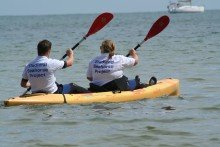Dorset Wildlife Trust has launched a project to raise awareness about the unique eco-system at Studland Bay, which supports rare species such as the endangered undulate ray.
Wardens will be kayaking in Studland Bay throughout the next 6 weeks, talking to visitors about the fragile eco-system beneath the waves. The aim of the project is to explain the dangers of damage to precious seagrass meadows on the seabed. Seagrass is in decline worldwide, and is a scarce habitat in the UK, yet it provides a home to many precious and rare marine species. By anchoring carefully or using moorings, boat users can continue to enjoy the bay without causing damage.
They will be handing out a new leaflet from the RYA (Royal Yachting Association) which gives boat user’s advice and guidance when anchoring in areas rich with seagrass, with particular reference to Studland Bay. Wardens will also be asking for boaters points of view on how best to manage the site for the benefit of both themselves and the wildlife that lives there.
Unlike seaweed, seagrass has an extensive root system that binds the soft sand together creating a stable environment for all kinds of species, including juvenile bass, bream, flat-fish and both British seahorse species, which have been found to breed in Studland Bay. Other species which thrive in Studland Bay include all 6 species of British pipefish, including the rare Nilsson’s pipefish.
Dorset Wildlife Trust Marine Awareness Officer, Julie Hatcher said: “It is imperative that marine species which depend on seagrass to survive are given the best chance possible. To do that we need to ensure human activities, such as using anchors on the seabed, are not damaging the habitat. Seagrass is also important to us – it forms a natural coastal defence protecting the beach and cliffs from erosion and absorbs CO2 helping in our fight against climate change.”
Seagrass warden, Darren Lloyd said: “Often, if we can’t see something, we don’t think about it. We are here not only to raise awareness, but to ask the opinion of the people who use the bay, on how they think we could manage it. It’s not about lecturing people – it’s about making them aware of the issues, and working together to protect habitats for marine life at Studland Bay.”
DWT is pleased to be working in partnership with the Panache project, which has provided funding for the Studland Wardens. The ‘Panache’ project (Protected Area Network Across the Channel Ecosystem), aimsto lead to better protection and management of the marine environment through the development of a more coherent approach for Marine Protected Areas (MPAs) in the Channel Area.












